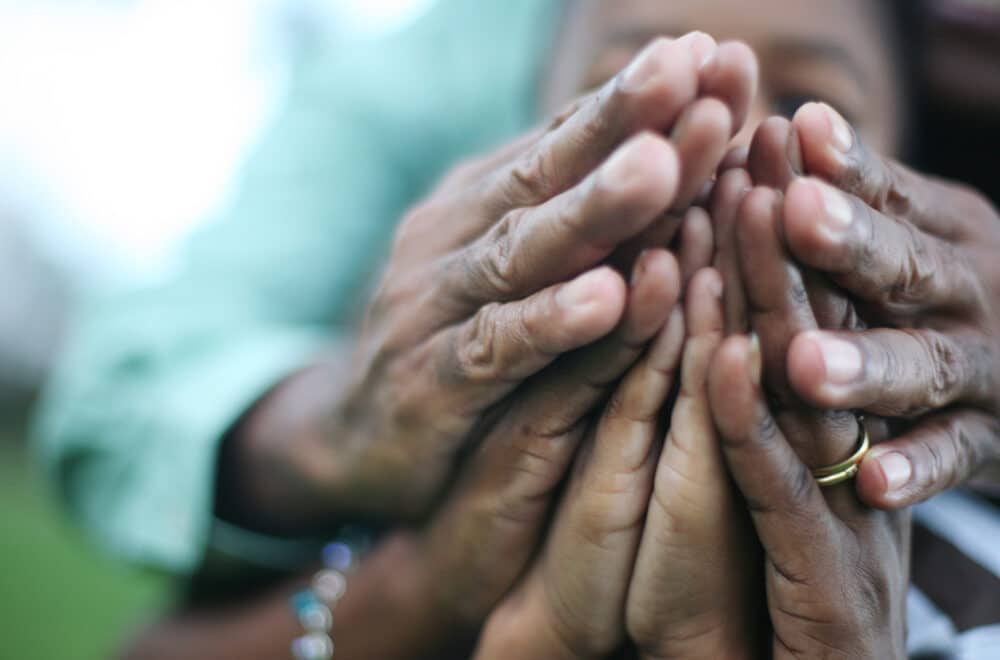Despair says circumstances tell us what is true about God. Hope says God tells us what is true about circumstances.
Life is filled with deep disappointment, unbearable loss, excruciating pain. Where is our loving, caring God?
A good friend was released from his job. Two years later, he was still out of work. Debt and discouragement stacked up side by side as the months crept by. Finally, he landed a great job, just the sort of thing he’d given up wishing he might find. Then, unbelievably, six months after he was hired, downsizing put him back on the street.
Veiled from View
The Bible says God would be the first to agree that things are not the way they are supposed to be. This is not the world of shalom that God long envisioned and first made. Sin crept into the garden and overran everything. Since Adam and Eve’s stumble in Eden, all creation has been “subjected to frustration” and is in “bondage to decay” as Paul describes in Romans 8:20, 21.
Has God, then, lost control of His world? Far from it. God will make things right. Running like a river through the pages of the Bible is the promise that all that is lacking will be filled, all that is broken will be restored, all that is wronged will be righted.
True, life can be hard. But hope is faith’s answer to the God-is-good-but-life-is-hard conundrum, that painful gulf between what is and what should be. Hope holds stubbornly to the belief that—by God’s grace—what should be is what will be.
More than a Wish
When you chase the word hope around the pages of the Bible, you see that it refers to two different things: something inside of us and something outside of us.
The hope within is that sense of longing-mixed-with-anticipation familiar to anyone who has ever had to wait for a birthday or the circus. For the Bible’s writers, this confident expectation is the fruit of our suffering (Romans 5:4), the basis of our endurance (1 Thessalonians 1:3), and the source of our joy (Romans 12:12).
The outside-of-us hope is that sure and certain reality to which our inside hope is pinned. By definition it remains a future reality. “Who hopes for what they already have?” Paul asks in Romans 8:24.
What is its substance, this certain coming hope? The anchor of our hope is a future event, the culmination of God’s loving purposes in human history when Christ returns. Jesus will come back, and when He does, our upside-down world will be upended and restored once and for all.
This is what makes hope so different from a mere wish. What is wished for has no basis in reality. It is simply desire speaking. Hope, on the other hand, corresponds to something promised and real in God’s economy. It is longing pinned to something sure and certain. It is already ours, to be enjoyed at a future date.
Hope’s Nemesis
If there was a police lineup of all that had ever robbed anyone of hope, certainly the most fingered culprit would be that foul menace called Circumstance. Whether positive or negative, circumstances are persuasive, convincing us of their permanence and finality and insisting that they determine our well-being into the foreseeable future.
When positive circumstances crowd around us, we are tempted to deposit our hope in them, not the Lord. Negative circumstances are equally adept at crowding out our view of deeper realities.
Despair says circumstances tell us what is true about God. Hope says God tells us what is true about circumstances.
Tightening Our Grip
How do we strengthen our grip on the hope that threatens to slip though our grasp? I’ve found a couple of principles to be helpful:
• Close your eyes to the persuasive pull of circumstances. When circumstances crowd out your view of God, stop looking at them. Shut your eyes.
• Quit believing that life stops when pain starts. Pain has a place in God’s redemptive work. If we run from pain, we may miss out on important growth God wants to produce in us.
• Remember the goodness of God. The greatest temptation in hard times is to believe that God is not up to the task. Not so. Look behind you at past evidence of God’s loving purposes. God is always good. Lay hold of His loving character. We may not know His purposes, but we do know His heart.
• Live with one eye fixed on heaven. Our senses scream that this is all there is—that life is the sum total of profession plus possessions, and death ends it all. This world is neither our home nor our hope. Both wait just round the corner from this life.
The Last Word
My friend who twice lost his job presses on. At work in a temporary position, he longs for the day when the Lord will fulfill the ministry dreams he has been forming in his heart during the waiting. But that’s not his focus. Hope, he says, is not pinned to a particular picture of the way life ought to be but to the loving purposes of God day to day.
Hope is letting God have the last word.
Bible Study Questions:
Reasons to Hope
These questions and Scriptures are a follow up to the article on pages 6-7. Use for your personal devotional time or to study with a friend.
1. From Romans 8:18-39, list the reasons you find for hanging on to hope.
2. According to the following verses, in what did the writers of Scripture place their hope?
Romans 5:1,2
Romans 8:23
Titus 2:11-13
Titus 3:4-7
1 Peter 1:13
1 John 3:2,3
3. What are some benefits to those who place their hope in God?
Psalm 16:8-11
Psalm 33:18-22
Psalm 146:5-9
Jeremiah 17:7,8
Adapted from Discipleship Journal, Issue 114, November 1999. Used by permission of NavPress.
David W. Henderson is senior pastor of Covenant Church (EPC) in West Lafayette, Indiana. He is the author of Culture Shift and Tranquility: Cultivating a Quiet Soul in a Busy World.




By commenting, you agree to our Code of Conduct.